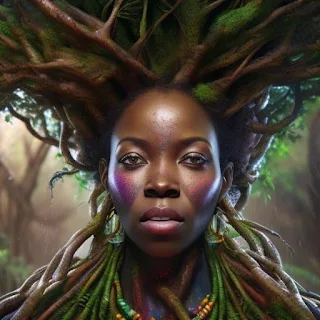Deep Roots, Deep Conflict: Lila vs. The Evergreens - A Gothic African Folktale
The Mother's roots run deep, and her love is a binding that feels like a curse to those who defy her.
 |
| Lila's roots are the binding threads of the world |
The Awakening of the Root-Mother
Before the first rain, there was only the Groaning—a constant, grinding roar of rock and fire. The world was a wound, and from its fevered core, a consciousness pushed its way into being. Not born, but unearthed. She was the first thought of the planet, a spark that named itself Lila, and her roots were not of wood, but of will, plunging deep into the heart of the chaos, binding the tumult into a fragile order.
With roots of stone and veins of river, Lila wove the world into existence. She did not simply create life; she extracted it from the raw stone, singing the first cells into being with a whisper that was both a lullaby and a command. Every forest was a extension of her nervous system, every creature a thought given flesh. She was the law, and the law was balance—a beautiful, terrible dance of decay and bloom, where death was the price of new life.
The Grief of the Unchanging
Lila loved her children, but her love was the love of a storm: it nurtured and it scoured. Among her first and proudest children were the Evergreens. She gave them resilience, the strength to hold fast when others would fall. But in their hearts, a poison took root: arrogance.
They looked upon the shedding trees—the oaks, the baobabs, the maples—and saw not a sacred surrender, but weakness. They refused the autumn call. They would not release their needles, would not let their old bones feed the new earth. They stood, perpetually green, hoarding light and soil, their shadows starving the seedlings below. They disrupted the great, gasping breath of the ecosystem, and in Lila's core, she felt the first pang of a world thrown out of tune.
She came to them not as a destroyer, but as a mother. Her voice was the rustle of falling leaves, the scent of wet earth after a storm. "To let go is not to die," she whispered through the mycelial networks that connected all things. "It is to become part of the whole again. Your stubbornness is a slow death for all that depends on you."
The Wrath of the Bound Earth
The Evergreens laughed, a sound like creaking boughs in a gale. "We are strength," they retorted. "We are endurance. We will not participate in your cycle of death. We are eternal."
And so, Lila's love curdled into a terrible, necessary wrath. The Mother showed them the face of the balance they had spurned. She did not send pests or fire as mere events; she unleashed them as extensions of her own despair. Blights that blackened their proud needles became her tears made manifest. Crown fires that roared through their groves were her feverish breath. The earth itself, which her roots commanded, grew thin and barren around them, a calculated starvation.
Yet the Evergreens, in their magnificent defiance, endured. They armored their bark with resin like amber scabs. They learned to burn and yet let their serotinous cones burst open in the ashes. Their struggle was a glorious, monstrous perversion of the resilience she had given them.
The Covenant of Scars
Exhausted by the conflict, Lila felt the plea of the other children—the animals that needed the falling leaves, the fungi that craved the decay. She heard the whisper of her own first law: balance, not annihilation.
There would be no victory, only a truce written in sacrifice. She went to the Evergreens, her form now a palpable pressure in the air, the smell of ozone and loam.
"You wish for eternity?" she intoned, her voice the grinding of tectonic plates. "Then you will know its weight. You will keep your green, but you will also know death. Each year, you will surrender a part of yourselves. You will let your oldest branches die and fall, a tribute to the soil you hoard. You will confine your kingdoms to the mountains and the cold north, and you will learn the loneliness of your strength."
It was not a request. It was a binding.
The Evergreens, humbled by her terrible power and their own wearying struggle, accepted the covenant. They did not bow, but a shudder passed through their collective boughs, and the first shower of dead, brown needles fell to the forest floor.
So the balance was restored, but it is a tense, brooding peace. The Evergreens stand in their realms, eternally green yet eternally shedding, a living monument to their own pride and the Mother's dreadful love. And in the deepest winter, when they hold their color against the grey world, it is not a sign of victory, but a reminder of the covenant—that even strength must bleed, and even the eternal must pay a price to the Root-Mother who binds us all.








